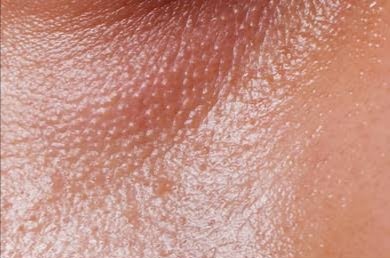You must have been conversant with these questions whenever you want to get skincare products, “what type of skin do you have?” or “what’s your skin type?” As important as it is in getting results when using a skincare product, it is also important to know your skin type because it is a determining if the product will give you desired results. It is good to know that your skin type can change over time. For example, younger people are more likely to have a normal skin type than older folks. More so, climate, hormones and diet can cause change in skin types.
Skin types depends on how much water is in your skin which affects its comfort and elasticity, how oily it is which affects its softness, and how sensitive it is. These bring us to the five basic skin types – Normal, Oily, Dry, Combination and Sensitive. Let’s take a look at how to determine your skin type.
Take a sheet of blotting paper and gently pat it on your face. Hold it against a bright light. If you see little to no oil, you likely have dry skin. If the sheet picks up some oil from the T-zone, you have combination or normal skin. If it picks up oil from all parts of your face, you likely have oily skin.
1. Normal skin: Normal is a term used to refer to well-balanced skin, neither too oily nor too dry, no severe sensitivity, barely visible pores, and a radiant complexion. Irrespective of your almost perfect skin, you also need to take care it too. Basically, you need to stay hydrated, wear sunscreen, moisturize, remove your makeup beore sleeping, cleanse your face beore sleeping and not skipping basic routine.
2. Dry skin: skin type characterised by less production of sebum than normal skin which leads to lack of lipids needed to retain moisture and build a protective shield against external influences. Dry skin can feel tight, rough, flaky, itchy and look dull with uneven texture. Causes vary from genetics, season, long showers which can rip your skin of its necessary oils and age.

Tips for Dry skin
- Daily exfoliation with gentle, non-abrasive ingredients help promote skin cell turnover without removing skin’s natural oils. This helps to remove additional layer of dead skin, so serums and treatments will be absorbed more easily.
- Use mild, gentle soaps or cleansers, moisturize your skin regularly to keep it soft and hydrated. Also drink lots of water.
- Don’t spend too much time in the shower and pat your skin gently while drying yourself up. Make sure you use sunscreen to prevent your skin from getting dehydrated
3. Oily skin: used to describe a skin type with heightened sebum production. This over production is known as seborrhea. Oily skin’s are majorly known to have large pores, prone to breakouts on the T-zones. A number of issues trigger the over production of sebum, such as genetics, hormonal changes and imbalance, medication, stress, comedogenic cosmetics…

Tips for Oily skin
- Moisturizing regularly will keep your skin hydrated and prevent it from overproducing sebum.
- Make use of moisturizers/toners containing hyaluronic acid and marine actives because of their ability to attract water and deliver it directly to skin cells without leaving a greasy film on the top layer.
- Stay hydrated by drinking a lot of water to keep your skin moist. This will prevent your skin from producing excess oil.
- It is advisable to reduce your face washing to twice a day to avoid overwash. Overwashing can remove necessary oils from your skin. The result can be having a sensitive and oil-prone skin.
4. Combination skin: as the name suggests, this indicates skin that consists of a mix of skin types (oily + dry). It can be identified when you have oily T-zone and dry cheeks, breakouts only on forehead, chin and nose, and sensitive cheeks. Combination skin type can also be figured out when your skin is dry in winter and oily in summer.
The oilier parts are caused by an over production of sebum and the drier parts, caused by a lack of sebum and a corresponding lipid deficiency.
Tips for Combination skin
Use a gentle cleansers, exfoliate gently every 3 days, avoid scrubbing your T-zone too much as it can damage your skin, wear oil-free sunscreen, apply products good for oil and dry skin
5. Sensitive skin: characterised by redness, itching, burning, dryness of the skin is sensitive, try to find out what your triggers are so you can avoid them. There are many possible reasons, but often it’s in response to particular skin care products.Best way to know a product is good for your skin is to conduct a patch test before using it, to avoid your skin from reacting.

How to conduct a patch test: Don’t use a product without testing it on your hand. Wait for 24 hours after the patch test. If your skin doesn’t react to it, go ahead and apply it to your face.
for more information or questions send us email
info@vicsflawlessproduct.com
you can visit our website to Shop
https://vicsflawlessproduct.com/collections/all















1 comment
Nice one, I learnt alot
Thank you